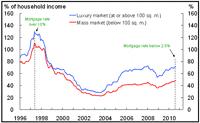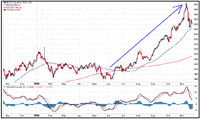 Spot the Bubbles Spot the Bubbles
Puru Saxena
Posted Jan 11, 2011
BIG PICTURE – Let the truth be known, the world is being held hostage by powerful bankers. Thanks to the fiat-money fractional reserve system, bankers have become the ruling elite and as a result, entire nations are going bust.
Make no mistake, the world’s most severe recession in decades was caused by excessive debt and in the boom years, bankers provided the narcotic in the form of cheap credit. A few years ago, bankers willingly handed out unserviceable loans and they made fortunes from the interest payments. In those heady days, major banks made obscene amounts of money and their management went home with hundreds of millions of dollars. When the times were good and most debtors were servicing their loans, profits were distributed amongst the banks’ management, shareholders and bondholders. However, when the music stopped and the credit binge turned into a colossal bust, laws were promptly enacted to ‘bail out’ these morally and financially bankrupt institutions.
Instead of letting the insolvent banks fail, the ruling elite orchestrated bail-out packages whereby the (already struggling) citizens of over-indebted nations made whole the losses of the very institutions which had put them in their misery! Look. These bail-out packages were totally unethical and they were designed solely to benefit the banking elite. After all, if the establishment was genuinely concerned about the welfare of the public, its policy measures would have directly benefited the distressed citizens. Instead, the stimulus was geared towards saving the banks and the public paid the bill (Figure 1).
Figure 1: The cost of the ‘bail-outs’

Source: International Monetary Fund
By dropping interest-rates to near zero and creating trillions of dollars in new money, the establishment may have saved its banking cronies. However, there is no such thing as a free lunch and the citizens of the developed world will have to pay for these bail-outs. Unfortunately, over the following decade(s), a large proportion of the output in the developed world will be used to serve this gigantic debt and this will act as a serious drag on economic growth.
More importantly, by pursuing grossly irresponsible monetary policies, the world’s most important central bank is (once again) inflating dangerous asset bubbles. It is noteworthy that by increasing the supply of money like there is no tomorrow and by maintaining negative real interest rates, the Federal Reserve is breeding new asset bubbles.
In our view, the Federal Reserve’s reckless policies have spawned gigantic bubbles in the following asset-classes:
a. Government debt – Given the precarious health of the developed economies and the huge mountain of debt, we find it absurd that bond yields are trading close to their historical lows. It is our conjecture that the government debt market is extremely overvalued and an abrupt adjustment is plausible.
In any event, we are of the view that government bond yields bottomed out in December 2008 and over the following years, interest-rates will trend higher.
Make no mistake, most of the developed nations in the world are insolvent and we are amazed that their creditors are not demanding a higher return on their capital! As far as the US is concerned, for now, the Federal Reserve is manipulating the bond market by monetising debt, but no Ponzi scheme can go on forever.
At some point, when the bond vigilantes awaken to the ongoing monetary inflation, they will dump their government debt securities. When that happens, interest-rates will rise and the government bond market will plunge, perhaps significantly.
b. Chinese real-estate – Our long-term optimism towards China notwithstanding, we are of the belief that real-estate in the coastal cities of China is grossly overvalued.
Yes, the Chinese economy is booming and yes, the urbanisation trend is still intact. However, no market goes up forever and if our assessment is correct, China’s real-estate bubble may be on the verge of leaking some air.
If you are heavily exposed to the Chinese property market, you may want to note that on a nationwide basis, it now takes 12 years of household income to purchase a home. Furthermore, when you consider cities such as Shanghai and Beijing, it now takes almost 20 years of household income to purchase a home! Clearly, these numbers reveal that Chinese housing is significantly overvalued, therefore vulnerable to a big adjustment.
Last but not least, it is noteworthy that the Chinese government is cracking down on property speculation and it has recently raised the banks’ minimum reserve requirement to a hefty 18%. Thus, Beijing is taking steps to cool things down and if history is any guide, China’s property market will deflate over the following months.
c. Hong Kong real-estate – In addition to mainland China’s real-estate market, we are also worried about the property bubble in Hong Kong.
It is noteworthy that Hong Kong’s currency is pegged to the US Dollar, therefore the former British colony does not have the luxury of pursuing its own monetary policy. Instead, Hong Kong inherits its interest-rate from the Federal Reserve. This implies that these days, a new HIBOR mortgage will cost you a princely sum of approximately 1% per annum!
There can be no doubt that thanks to extremely low interest-rates in the US, Hong Kong’s property market has appreciated considerably over the past two years. However, we are of the view that this party has seen its best days and those who choose to stay, will see their paper wealth turn into pumpkin and mice.
Figure 2 shows that during the heyday of the previous property boom in 1997, Hong Kong’s mortgage repayments accounted for 130% of household income! However, it is worth mentioning that back then, the mortgage rate was over 10%. Today, even with the mortgage rate below 2.5% for the luxury property segment, mortgage repayments already account for approximately 72% of household income!
Figure 2: Hong Kong – Mortgage repayment to income ratio
(Click on images to enlarge)

Source: Hong Kong Monetary Authority
This statistic is ominous and shows that Hong Kong’s property market is extremely vulnerable to increases in the mortgage rate. To complicate matters further, Hong Kong’s government has recently taken various steps to clamp down on property speculation and this leads us to conclude that the city’s real-estate bubble may be on the verge of deflating. Obviously, we cannot forecast the true extent of the looming bust, but we do know that mean reversion is one of the great truisms of capitalism and markets overshoot, both to the upside and the downside.
In addition to the above full-blown asset bubbles, we suspect the Federal Reserve’s disastrous policies are creating additional dislocations in the commodities complex and the stock markets of the developing world.
As far as commodities are concerned, they are benefiting as nervous investors look for a ‘safe haven’ to preserve their purchasing power. It is notable that since the Federal Reserve announced the second round of quantitative easing, the US Dollar Index has weakened considerably and the Reuters-CRB Index has inflated (Figure 3).
Figure 3: Commodities love Mr. Bernanke!

Source: www.stockcharts.com
Now, if the Federal Reserve continues with its money creation antics, it is conceivable that we may get a run on the US Dollar. Under this scenario, some of the capital will probably flow to commodities, thereby causing price shocks in the global economy.
Last but not least, we are of the view that the Federal Reserve is spawning a historic bubble in the stock markets of the developing world. Over the following months, as growth and yield-hungry investors search for returns on their capital, it is likely that they will look for investment opportunities in the fast-growing developing markets.
After all, the developing world is growing at a much faster clip than the developed world and it is this growth differential which will prompt people in the West to invest in these exciting markets. Even though the stock markets of the developing nations are currently reasonably valued, we believe that in the future, they will trade at a premium to the stock markets of the developed world.
Given the fact that we believe that commodities and the stock markets of the developing world will be the prime beneficiaries of the ongoing monetary debauchery, we are maintaining our investment exposure to these assets.
###
Puru Saxena
 Saxena Archives Saxena Archives
email: puru@purusaxena.com
website: www.purusaxena.com Puru Saxena publishes Money Matters, a monthly economic report, which highlights extraordinary investment opportunities in all major markets. In addition to the monthly report, subscribers also receive "Weekly Updates" covering the recent market action. Money Matters is available by subscription from www.purusaxena.com. Puru Saxena is the founder of Puru Saxena Wealth Management, his Hong Kong based firm which manages investment portfolios for individuals and corporate clients. He is a highly showcased investment manager and a regular guest on CNN, BBC World, CNBC, Bloomberg, NDTV and various radio programs. Copyright ©2005-2015 Puru Saxena Limited. All rights reserved.
Recent Gold/Silver/$$$ essays at 321gold:
Jan 28 This past week in gold Jack Chan 321gold
Jan 27 A Bull Era For The Miners Stewart Thomson 321gold
Jan 25 Aztec Minerals Scores Bonanza Gold at Tombstone Bob Moriarty 321gold
Jan 23 Gold Stocks: Untapped Upside For Investors Morris Hubbartt 321gold
Jan 23 Gold's China Takeover Adam Hamilton 321gold
Jan 20 Are Gold Targets Like $20,000 Realistic Stewart Thomson 321gold
|
321gold Ltd

|

 Spot the Bubbles
Spot the Bubbles


